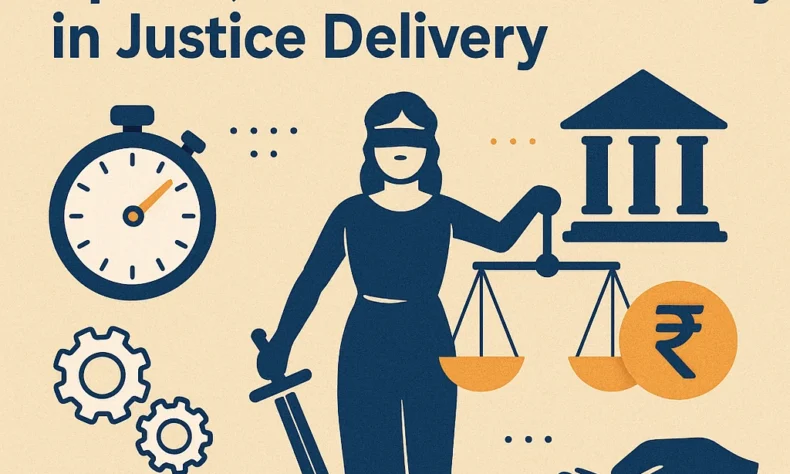
By Kavya
Alternative Dispute Resolution (ADR) plays a crucial role in the framework of justice in India. Docket burdened courts, prolonged court case delays, and exorbitant costs of litigation make ADR-the ADR model of mediation, conciliation, and arbitration-an indispensable component of our future dispute-resolution policy, rather than an optional avenue within such policy. The enactment of the Mediation Act, 2023 is a bold new legislative turn: it institutionalizes mediation, guarantees enforceability to settlements mediated, and mainstreams online and community mediation. But while ADRs promise expeditious resolution and cost savings, they also raise larger issues of fairness and access to justice, and the dangers of pushing public adjudication to the background. This article presents the benefits and disadvantages of ADR in India, particularly with respect to the main aspects of the Mediation Act. The analysis would review the application of the Act in commercial disputes and evaluate it against the accessibility to justice concerns.
Why ADR Matters in India
India’s judicial backlog is a significant issue. Millions of cases are stuck in courts at all levels, causing litigants to wait years for a final hearing. Alternative Dispute Resolution (ADR) provides a different path: private or semi-institutional settings where parties can negotiate or get help from a third party to settle disputes without going through a full court trial. The various ADR methods—like mediation, arbitration, conciliation, Lok Adalat, and negotiated settlements—are appealing because they tend to be quicker, more cost-effective, confidential, and less confrontational than traditional litigation. The Mediation Act 2023 specifically recognizes these advantages and aims to create an appropriate legal structure for promoting mediation in institutional, online, and community contexts.
The Mediation Act, 2023 — what it does
The Mediation Act of 2023 (let’s call it “the Act”) is designed to encourage and streamline mediation, making mediated settlement agreements as enforceable as a court decree. Here are some of its key features:
- it officially recognizes voluntary mediation is effectively demanded for civil or commercial matters by the law.
- it sets a time limit for mediation—generally 180 days, with a few exceptions for extensions.
- it includes options for online and community mediation.
- it establishes a Mediation Council of India to handle registration, standardization, and oversight.
- it outlines specific and limited reasons for challenging mediated settlement agreements, such as fraud or coercion. Moreover, the Act outlines the role of institutional mediation providers and includes provisions for registering mediated settlement agreements.
Pros of ADR
- Speed and reduced backlog — ADR can resolve disputes in months instead of years to relieve judicial backlog and give quicker relief to litigants. Time limits were provided in the Act so that mediation does not prove to be another source of delay.
- Lower costs — mediation and negotiated settlements are generally less than in litigation, including legal fees and procedural expenses. For many small and medium enterprises and individuals, the savings may well prove decisive.
- Flexibility and party autonomy — A variety of remedies and outcomes can be fashioned by parties through ADR that may not be able to be ordered by courts (e.g., sophisticated commercial accommodations, continuity of business, or private settlements).
- Confidentiality and preservation of relationships — Mediation is private, which is especially valuable in commercial and family disputes, where business ties or social harmony can be maintained. Community mediation, explicitly recognized by the Act, aids in local peacemaking and maintenance of social capital.
- Enforceability — The Act also provides an avenue to convert mediated settlements into enforceable instruments through statute, and this clarifies the legal status of mediated outcomes and thereby encourages uptake by parties and institutions.
Cons and challenges of ADR
- Power imbalances and coercion risk —ADR’s laid-back approach can sometimes mask the inequalities in bargaining power. A weaker party may feel coerced into accepting an unfair settlement to avoid delays or costs. Protecting coercion, misrepresentation, and fraudulent consent while maintaining finality is perhaps the Act’s greatest challenge-and limitation.
- Access to justice concerns — while ADRs may provide more access for some, there is a risk that parties with poor resources may be directed away from court remedies that may grant them greater procedural protections or create precedent-setting rulings. The State’s duty to ensure substantive justice remains critical.
- Quality and standardisation of mediators — rapid scaling requires large numbers of trained mediators and institutions. The envisaged Mediation Council of India will be responsible for the registration and regulation of mediators; however, capacity building, ethical standards, and quality assurance will take the long haul.
- Commercialisation and cost escalation — high-value commercial mediation gets expensive solely on the account of increasing institutional fees and private mediator rates; conversely, the “cheap” advantage is not an automatic one.
- Limited suitability — some disputes (grave penal matters, public law questions, public policy considerations, or those that require adjudication of one party’s rights to lay down a precedent) may not be fit for ADR. The Act recognizes that certain disputes are unsuited for mediation.
ADR in Commercial Disputes: Advantages and Caveats
Commercial disputes are like a natural playground for Alternative Dispute Resolution (ADR) in India. Businesses really appreciate the quick resolutions, confidentiality, and the chance to maintain their commercial relationships—qualities that mediation and arbitration are designed to provide. Mediation, in particular, can be a lifesaver for parties looking to preserve their business ties through innovative solutions like payment plans, technology transfers, or revised contract terms that courts might not easily enforce. The Mediation Act’s formal acknowledgment of institutional and online mediation is especially important for cross-border or tech-heavy commercial disputes. With institutional procedures and the Act’s enforceability provisions, mediated agreements become a lot more trustworthy for businesses. However, there are some caveats to keep in mind: power imbalances between big corporations and small suppliers, the risk of ‘forum shopping,’ and the rising costs of mediators and institutions can all chip away at ADR’s cost-effectiveness. Plus, since mediation settlements don’t set binding judicial precedents, issues related to public law or widespread commercial practices might still need to be resolved through litigation or appeals.
Impact on Access to Justice
ADR plays a twofold role in shaping access to justice. On one side, it makes dispute resolution more accessible by cutting costs, minimizing delays, and providing decentralized options like community and online mediation. This is a significant advantage for many individuals who might struggle to afford traditional litigation. The Act even highlights community mediation as a way to address disputes that impact local peace and harmony, which could really transform how neighborhood, tenancy, and family conflicts are resolved. However, access to justice isn’t just about finding any solution; it’s about ensuring that the process is fair, impartial, and respects everyone’s rights while offering suitable remedies. If ADR turns into a standard, mandatory step before litigation without the right protections—like legal aid in mediation, safeguards for vulnerable parties, accessible institutions, and trained public mediators—then those who are already at a disadvantage might end up with less favorable outcomes. The real challenge for policymakers is to make sure that ADR enhances, rather than replaces, the judicial protections that are crucial when it comes to developing the law or safeguarding rights.
Challenges and The Road Ahead
Only time will tell whether the skeleton that the Mediation Act provides will be fleshed with successful implementation. Here are some critical areas:
• Intensive capacity-building to produce, arm, and empower a wide range of mediators and establish sufficient institutional centres countrywide, including rural areas.
• Regulation and ethics: It needs to establish transparent standards, grievance redressal mechanisms, and continuing professional development requirements so as to avoid malpractice and sustain the public confidence.
• Legal aid in mediation: What is most important is to have legal aid schemes special for mediation, which we call subsidy of public mediation institutions or legal aid-assisted mediation, to prevent ADR from becoming another tool in the unequal power game.
• Public Awareness: Average lay parties need to be informed as to what mediation means: the advantages, disadvantages, and rights to rescind or challenge a settlement, so that consent is truly informed and genuine.
• Data and accountability: Systematic mediations statistics collection and publication (settlement rates, durations, challenge rates, cost data) would be used to assess effectiveness and determine the best policy.
ADR, especially mediation, has incredible potential for India. It can help clear the judicial backlog, provide quick solutions, maintain relationships, and make resolving disputes cheaper and more accessible. The Mediation Act of 2023 is a significant milestone, giving legal weight to mediated agreements, acknowledging online and community mediation, and setting up a framework to regulate the field. But this potential won’t just happen on its own. To truly reap the benefits while ensuring justice, we need to implement it thoughtfully: protecting those who are vulnerable, building up institutional capacity, upholding ethical standards, linking legal aid with mediation, and keeping the courts as the protectors of rights and public law. If India can find the right balance—promoting settlements when suitable while ensuring access to the courts when needed—ADR won’t just be a quick fix; it will genuinely enhance the delivery of justice.
—Kavya is a student of Chanderprabhu Jain College of Higher Studies and School of Law, New Delhi
📰 Crime Today News is proudly sponsored by DRYFRUIT & CO – A Brand by eFabby Global LLC
Design & Developed by Yes Mom Hosting






